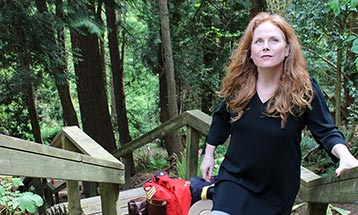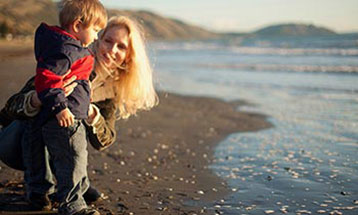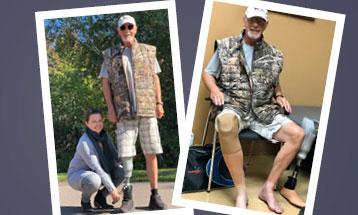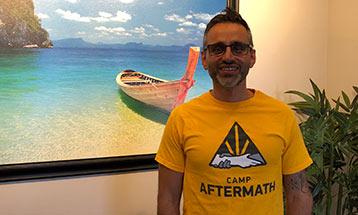
Laurie White is a former member of the Royal Canadian Mounted Police with a powerful story to tell.
So she told it, in a book. 10-33: An Officer Down Steps Back Up is Laurie White’s story about her journey—the hard work she did after losing a leg in the line of duty to return to her RCMP career, her community and herself.
Laurie shared her story to show the person behind the uniform, to increase awareness, empathy and compassion for the physical and mental health challenges of disabilities, and to offer hope.
Laurie White’s journey
Laurie was born in Brockville, Ontario. A lifelong figure skater and athlete, she earned a Bachelor of Physical Education from Brock University, and then a Master of Arts (Sports Studies) from the University of Ottawa.
After graduation, Laurie found herself doing part-time supply teaching, supplemented by physical fitness instructing, coaching skating and tending bar to pay the bills while living at her parents’ home.
Laurie felt frustrated with her career prospects. One day at the local YMCA, she met a Mountie who suggested she look into a career with the RCMP.
After the rigorous application process, Laurie went to the RCMP Depot Division in Regina, Saskatchewan to begin her six-and-a-half-month training to become an officer.
In March 1996, Laurie was posted to Kitimat, BC, a community of about 10,000. “Kitimat is beautiful. It is on the ocean, surrounded by mountains, lots of snow,” she recalls. “I met so many lovely people in my time there.”

The pivot point
Two and half years into her posting, on 27 November 1998, Laurie was shot in the leg by a suspect while executing a search warrant with two other officers. The other officers pulled her to safety, and after eight hours of surgery, doctors amputated the lower part of her right leg.
But Laurie didn’t give it up. After ten challenging months of intense, daily physical therapy, Laurie returned to full-time duties in Kitimat. To do that, Laurie had to prove that she was fit for duty. This included: a physical activity exam with a simulated foot chase; use-of-force tests; firearm certification; and a driving test. She passed them all, and is—to this day—believed to be the only RCMP officer in Canada to return to full active duties with an artificial leg.
Offering hope
Soon after returning to duty in Kitimat, a community group asked Laurie to speak on women’s wellness. “I didn’t know what they wanted to hear from me,” Laurie admits. “I was proud of being able to walk again, though, and talked about my experiences over the previous year.”
That led to a new career as a speaker. Since that first talk in 1999, she has spoken to groups across Canada, including to the RCMP cadets at Depot Division where she became a Mountie. “People wanted to know about my experience. I get questions about pain and physical limitations.

She moved to the Okanagan Valley in 2001, but in 2003, Laurie realized that she had to make a change. “The physiological fact is that, as an amputee, your energy expenditure changes. It just takes 35 to 40 percent more energy to do the same things. Something had to give.”
Laurie decided to leave operational policing, which “was a hard pill to swallow,” and took on new roles within the RCMP. In 2006, she moved to Surrey, BC. Since being accommodated by the force, her new duties included being a high-school liaison officer, D.A.R.E. training, the Air India Task Force, media relations, and security planning for the Vancouver Olympic Winter Games in 2010. “That was a very cool job,” she recalls.
In January 2020, Laurie retired from the RCMP and finished writing the story she had been working on for years. 10-33: An Officer Down Steps Back Up, the title based on the police radio code for “officer down.”
The inner journey
One of the most important lessons Laurie has learned is the importance of self-care. While her return to a career in the RCMP has inspired many, “I went through intermittent depression and suicidal thinking.” As a person with post-traumatic stress disorder, she sees a therapist regularly for self-care.
In her talks across the country, Laurie encourages people to look after their physical and mental health. “The key is to develop self-awareness and develop individual strategies to avoid dark places.”
“I get lots of questions about forgiveness. Do I forgive the man who shot me? I don’t.
“That used to be a struggle, because the idea put out there is that not forgiving someone is a burden on you. I disagree with that theory. But I’m not bitter nor resentful. For me, forgiveness was not the key to finding peace.”
10-33, Laurie’s story of coming back to her career after what many would consider a life-changing injury, is an important part of her journey.
“I wrote my memoir for many reasons: to offer hope, decrease judgment, and show that we are not alone, there are resources available, and we owe it to ourselves and our families to advocate for what we need.”



